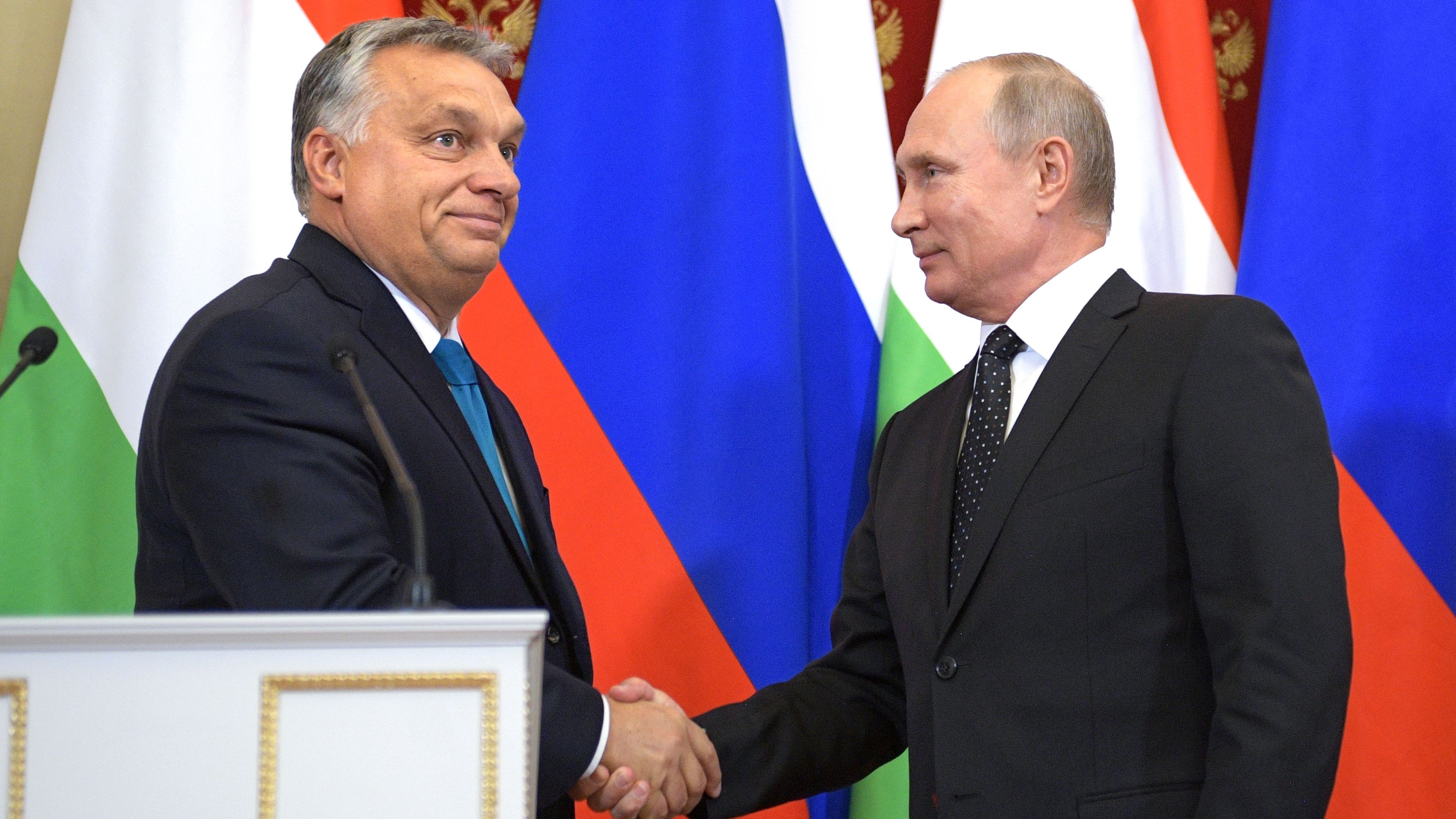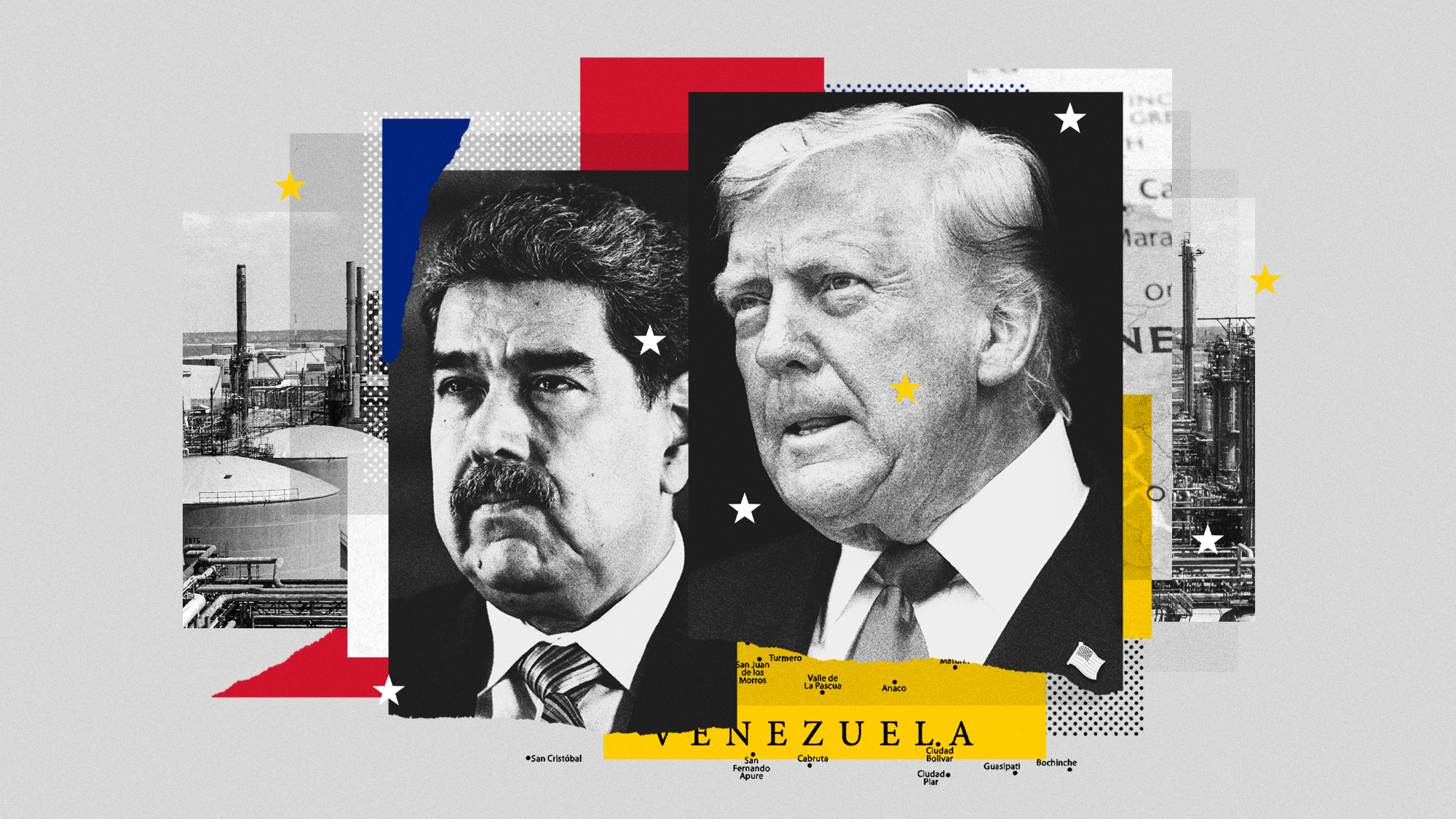How the Ukraine war is impacting Viktor Orbán’s re-election bid
The Hungarian prime minister has been Europe’s pro-Putin outlier for decades

A free daily email with the biggest news stories of the day – and the best features from TheWeek.com
You are now subscribed
Your newsletter sign-up was successful
Viktor Orbán is scrambling to put “gender insanity” and the EU’s support for gay rights at the centre of an election campaign so far dominated by awkward questions over the Hungarian prime minister’s relationship with Vladimir Putin.
Orbán, the EU’s longest-serving leader, has scheduled a referendum next month to confirm legislation outlawing the “promotion” of gender non-conformity, gender reassignment and homosexuality. In a first for Hungarian politics, the vote is to be held on the same day as the national election.
The voting double-up, on 3 April, is widely viewed as an attempt by Orbán to “avoid criticism” by shifting the focus away from his historically “pro-Russia” position, said The Guardian’s Brussels correspondent Jennifer Rankin.
The Week
Escape your echo chamber. Get the facts behind the news, plus analysis from multiple perspectives.

Sign up for The Week's Free Newsletters
From our morning news briefing to a weekly Good News Newsletter, get the best of The Week delivered directly to your inbox.
From our morning news briefing to a weekly Good News Newsletter, get the best of The Week delivered directly to your inbox.
Best frenemies
Addressing an election rally over the weekend, Orbán told a crowd of 100,000 supporters that “we will win the referendum to stop at Hungary’s borders the gender insanity sweeping across the Western world. We shall protect our families and our children – a father is a man, a mother is a woman and leave our children alone.”
The vote on gay rights “puts Hungary on another collision course with the EU over legislation that is being challenged as discriminatory at the European Court of Justice”, The Times reported.
But it is also an opportunity for the Hungarian PM to distract from the “tricky” question of where he stands on the Russian invasion of Ukraine, said Al Jazeera.
Orbán “has spent his rule earning the title of Putin’s closest EU ally”, the broadcaster continued. And since the Russian president gave the order for the Ukraine incursion, “Budapest has continued to seek to avoid alienating the Kremlin”.
A free daily email with the biggest news stories of the day – and the best features from TheWeek.com
Although “Orbán has publicly condemned Russia’s war and backed EU sanctions” on the world stage, said Politico, “the story from pro-Orbán media in Hungary is very different”.
Budapest has quickly become “the EU capital of Russian disinformation”, according to the news site. “To read and watch state-linked news in Hungary these days is to catch a steady stream of Kremlin-friendly framings, arguments and outright conspiracies about the war in Ukraine.”
The propaganda push has included claims that the CIA helped to instal the current Ukrainian government and that the US provoked Russia into attacking the neighbouring Eastern European nation.
From “state-owned media to pro-government outlets that are propped up with taxpayer-funded advertising”, Politico added, pundits linked to Orbán’s Fidesz party are “promoting conspiracy theories about the conflict and relativising Russia’s aggression”.
Although his government “did not veto Brussels’ sanctions”, said Al Jazeera, Orbán has said “Hungary will neither reduce its Russian energy reliance nor allow weapons heading for Ukraine to transit its territory”. But this” ambiguity” is earning “international scorn”.
The Hungarian leader appears “committed to splitting the difference between Brussels and Moscow”, wrote Péter Krekó, director of the Budapest-based Political Capital Institute think tank, in an article on Foreign Policy. After almost a month of war in Ukraine, Orbán’s government is still “trying to maintain its membership in Western alliances while cosying up to Russia”.
“But Orbán’s room is now limited,” said Krekó. “Reluctant support for the EU sanctions package after failing to block it shows underscores the power of the Western alliance.”
Changing tide
While Hungarian state media remains “home to Kremlin talking points”, public opinion is shifting across the country as refugees begin “appearing at Hungarian train stations” and reports from inside Ukraine emerge, Politico said.
An “outpouring of sympathy for Ukrainians fleeing for their lives” has fostered a “bewildering atmosphere in a country where some citizens still remember first-hand how the Soviet Union brutally crushed the 1956 Hungarian revolution”.
And that leaves Orbán “treading a fine line” ahead of April’s election, as he battles to “avoid criticism of his pro-Putin policy” while “staying on board with the EU and Nato”, said The Guardian’s Rankin.
His main opposition, Peter Márki-Zay, has accused Orbán of being too accommodating towards both Russia and China. “We only have one choice: we must choose Europe instead of the East, and freedom instead of authoritarianism,” Márki-Zay said at an opposition rally last week.
The biggest issue for Orbán is that with the vote just weeks away, he is “struggling to neutralise a decade of pro-Putin messaging”, said the Financial Times. Having “long delighted in displaying some of the EU’s clearest pro-Russia credentials”, Orbán is now being forced to “shift his position as he tries to stay in step with voters”.
“Fidesz had not reckoned with such a difficult situation arising in the campaign,” Robert Laszlo, an election expert at the think-tank Political Capital in Budapest, told the paper. “They have an identity problem now, which is decidedly risky for them.”
Al Jazeera argued that following weeks of wavering, “Fidesz is now firmly establishing its own narrative”.
“In this scenario, Orbán is hailed as the guarantor of peace and stability for Hungarians” amid the ongoing war, according to the broadcaster.
Krekó warned on Foreign Policy that if voters re-elect Orbán, “he will threaten the West by breaking the unity surrounding sanctions” and “blackmailing his so-called allies with vetoes” on further action against Russia.
“Hungary’s election will soon decide how much longer the spectre of Putinism will haunt Europe,” Krekó added.
-
 Political cartoons for February 16
Political cartoons for February 16Cartoons Monday’s political cartoons include President's Day, a valentine from the Epstein files, and more
-
 Regent Hong Kong: a tranquil haven with a prime waterfront spot
Regent Hong Kong: a tranquil haven with a prime waterfront spotThe Week Recommends The trendy hotel recently underwent an extensive two-year revamp
-
 The problem with diagnosing profound autism
The problem with diagnosing profound autismThe Explainer Experts are reconsidering the idea of autism as a spectrum, which could impact diagnoses and policy making for the condition
-
 How corrupt is the UK?
How corrupt is the UK?The Explainer Decline in standards ‘risks becoming a defining feature of our political culture’ as Britain falls to lowest ever score on global index
-
 ‘The mark’s significance is psychological, if that’
‘The mark’s significance is psychological, if that’Instant Opinion Opinion, comment and editorials of the day
-
 Trump’s ‘Board of Peace’ comes into confounding focus
Trump’s ‘Board of Peace’ comes into confounding focusIn the Spotlight What began as a plan to redevelop the Gaza Strip is quickly emerging as a new lever of global power for a president intent on upending the standing world order
-
 The high street: Britain’s next political battleground?
The high street: Britain’s next political battleground?In the Spotlight Mass closure of shops and influx of organised crime are fuelling voter anger, and offer an opening for Reform UK
-
 Trump considers giving Ukraine a security guarantee
Trump considers giving Ukraine a security guaranteeTalking Points Zelenskyy says it is a requirement for peace. Will Putin go along?
-
 Vance’s ‘next move will reveal whether the conservative movement can move past Trump’
Vance’s ‘next move will reveal whether the conservative movement can move past Trump’Instant Opinion Opinion, comment and editorials of the day
-
 What have Trump’s Mar-a-Lago summits achieved?
What have Trump’s Mar-a-Lago summits achieved?Today’s big question Zelenskyy and Netanyahu meet the president in his Palm Beach ‘Winter White House’
-
 Why, really, is Trump going after Venezuela?
Why, really, is Trump going after Venezuela?Talking Points It might be oil, rare minerals or Putin